Back To Faculty



Jonathan Dickstein, PhD
Tirthankara Shreyansanath Endowed Assistant Professor of Jain and Vegan Studies, Arihanta Institute
MA Faculty
Welcome Video

Jonathan Dickstein, PhD, the Tirthankara Shreyansanath Endowed Assistant Professor of Jain and Vegan Studies at Arihanta Institute, specializes in South Asian Religions, Religion and Ecology, and Comparative Religious Ethics. He received his doctoral degree in Religious Studies from the University of California, Santa Barbara, where he wrote his dissertation on ancient Indian animal taxonomies and their relevance for religious ritual and dietary practice. Jonathan’s current work focuses on Jainism and contemporary ecological issues, and accordingly extends into Critical Animal Studies, Food Studies, and Diaspora Studies.
Jonathan has published in a wide array of interdisciplinary journals on topics such as veganism and politics, yoga and diet, Jain veganism, and the ethic of nonviolence (ahiṃsa). Jonathan considers himself a scholar-practitioner, having spent many years not only in libraries but also in public advocating for justice for both humans and nonhumans alike.
Jonathan has published in a wide array of interdisciplinary journals on topics such as veganism and politics, yoga and diet, Jain veganism, and the ethic of nonviolence (ahiṃsa). Jonathan considers himself a scholar-practitioner, having spent many years not only in libraries but also in public advocating for justice for both humans and nonhumans alike.
Research
PhD in Religious Studies, University of California-Santa Barbara
MA in Religious Studies, University of Colorado-Boulder
Dr. Dickstein is a specialist in the premodern religious traditions of South Asia. His three areas of research span Yoga Studies, Religious Studies, Critical Animal Studies, Environmental Studies, Diaspora Studies and Comparative Ethics.
Dr. Dickstein’s previous research involved issues of theism, agnosticism, and atheism in yoga traditions. Critical questions involved the existence and role of a supreme deity in effecting a practitioner’s eventual achievement of the goal of liberation. Dr. Dickstein is finalizing an article on theism in the Pātañjala Yogaśāstra and its relevance for the beliefs, sensibilities, and aims of contemporary practitioners. He sees this work as broadly informative on how practitioners in Jain and non-Jain yoga traditions reconcile ancient views on soteriology and ethics with current atheistic trends in yoga practice and yoga-inspired practical ethics.
Currently focused on Animal Studies, Dr. Dickstein’s doctoral work investigated ancient Indic perspectives on domesticated animals, examining animal taxonomies and their relationships to regulations on ritual sacrifice and dietary practice. Ancient Jain texts offer a unique viewpoint on this topic given their emphasis on the sense-faculties of various living beings, and sentience as the basis for human ethical responsibilities towards animals and the environment. In his current scholarship, Dr. Dickstein draws parallels between this Jain viewpoint and contemporary arguments in moral philosophy that reject anthropocentric and species-centric approaches to animal and environmental ethics.
Dr. Dickstein will soon initiate a new research project that connects the long history of animal rescue and caretaking in Jainism with animal rights advocacy in the United States that also promotes the rescue and caretaking of exploited animals. Using an animal sanctuary in Colorado as the field location from which to generate this discussion, Dr. Dickstein will put Jainism’s rich history of caring for animals in conversation with the direct action tactics employed by animal activists to rescue animals from sites of abuse.
MA in Religious Studies, University of Colorado-Boulder
Dr. Dickstein is a specialist in the premodern religious traditions of South Asia. His three areas of research span Yoga Studies, Religious Studies, Critical Animal Studies, Environmental Studies, Diaspora Studies and Comparative Ethics.
Dr. Dickstein’s previous research involved issues of theism, agnosticism, and atheism in yoga traditions. Critical questions involved the existence and role of a supreme deity in effecting a practitioner’s eventual achievement of the goal of liberation. Dr. Dickstein is finalizing an article on theism in the Pātañjala Yogaśāstra and its relevance for the beliefs, sensibilities, and aims of contemporary practitioners. He sees this work as broadly informative on how practitioners in Jain and non-Jain yoga traditions reconcile ancient views on soteriology and ethics with current atheistic trends in yoga practice and yoga-inspired practical ethics.
Currently focused on Animal Studies, Dr. Dickstein’s doctoral work investigated ancient Indic perspectives on domesticated animals, examining animal taxonomies and their relationships to regulations on ritual sacrifice and dietary practice. Ancient Jain texts offer a unique viewpoint on this topic given their emphasis on the sense-faculties of various living beings, and sentience as the basis for human ethical responsibilities towards animals and the environment. In his current scholarship, Dr. Dickstein draws parallels between this Jain viewpoint and contemporary arguments in moral philosophy that reject anthropocentric and species-centric approaches to animal and environmental ethics.
Dr. Dickstein will soon initiate a new research project that connects the long history of animal rescue and caretaking in Jainism with animal rights advocacy in the United States that also promotes the rescue and caretaking of exploited animals. Using an animal sanctuary in Colorado as the field location from which to generate this discussion, Dr. Dickstein will put Jainism’s rich history of caring for animals in conversation with the direct action tactics employed by animal activists to rescue animals from sites of abuse.
Publications
“Veganism as Left Praxis.” Capitalism Nature Socialism 33, no. 3(2022): 56–75.
“Review: Sacred Cows & Chicken Manchurian: The Everyday Politics of Eating Meat in India by James Staples.” Himalaya Journal 40, no. 2 (2021): 164–166.
“Jain Veganism: Ancient Wisdom, New Opportunities.” Religions 12, no. 7 (2021): 512.
“Animal Abuse in Modern Yoga Gastropolitics.” Sacred Matters Magazine, May 16, 2021.
“The Ism in Veganism: The Case for a Minimal Practice-Based Definition.” Food Ethics 6, no. 2 (2021).
“Why Aren’t We All Boycotting Factory Farms?” Sentient Media, October 5, 2020.
“Ahiṃsā.” In La Pensée végane. 50 regards sur la condition animale, ed. Renan Larue. Paris: Presses Universitaires de France, 2020.
“The Strong Case for Vegetarianism in Pātañjala Yoga.” Philosophy East and West 67, no. 3(2017): 613–628.
“Review: Sacred Cows & Chicken Manchurian: The Everyday Politics of Eating Meat in India by James Staples.” Himalaya Journal 40, no. 2 (2021): 164–166.
“Jain Veganism: Ancient Wisdom, New Opportunities.” Religions 12, no. 7 (2021): 512.
“Animal Abuse in Modern Yoga Gastropolitics.” Sacred Matters Magazine, May 16, 2021.
“The Ism in Veganism: The Case for a Minimal Practice-Based Definition.” Food Ethics 6, no. 2 (2021).
“Why Aren’t We All Boycotting Factory Farms?” Sentient Media, October 5, 2020.
“Ahiṃsā.” In La Pensée végane. 50 regards sur la condition animale, ed. Renan Larue. Paris: Presses Universitaires de France, 2020.
“The Strong Case for Vegetarianism in Pātañjala Yoga.” Philosophy East and West 67, no. 3(2017): 613–628.
Jonathan Dickstein, PhD's Courses
Self-paced
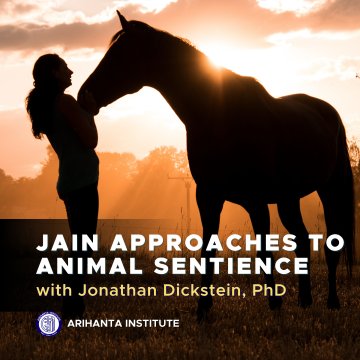
1011 | Jain Approaches to Animal Sentience
Added to cart
1011 | Jain Approaches to Animal Sentience
Jainism’s foundational ethical principle of non-harming assumes that living beings can be harmed by the acts of others. The ability to be harmed by others is not shared by all entities, as neither Jainism or mainstream science maintains that brute objects such as tables or bricks can be, technically speaking, “harmed.” Learn Jain and non-Jain perspectives on the differences between sentient and insentient entities; Jain categorizations of plant and animal life; modern philosophical and scientific approaches to sentience; the relationship of sentience to ethics; and the theoretical and ethical challenges posed by entities such as plants, insects, bivalves, and other beings. All suggested course readings are provided as links and pdfs throughout the course.Learning Objectives:* Answer the question “What is Sentience?” and learn western scientific approaches to sentience* Learn Jain approaches to sentience which consider sense faculties and minds* Understand the connections between sentience, pain, and ethics* Look at sentience “on the fringes” including questions around plants, bivalves, and other beings
$99.00 USD
Instructor
Self-paced
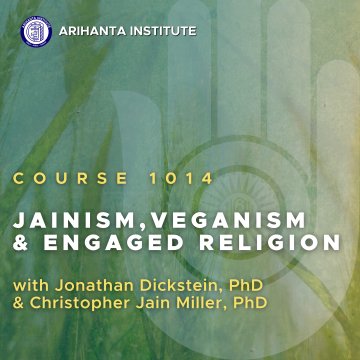
1014 | Jainism, Veganism, and Engaged Religion
Added to cart
1014 | Jainism, Veganism, and Engaged Religion
Committed to nonviolence (ahiṃsā) since its ancient beginnings, the Jain tradition has admonished the mistreatment, slaughter, sacrifice, and consumption of animals for thousands of years. In light of these commitments, Jains have traditionally lived a lacto-vegetarian lifestyle, advocated for the legal protection of animals, and have created sanctuaries for animals for centuries. In ancient and medieval scriptural sources, we even find restrictions on the consumption of dairy itself, suggesting potential pre-modern Jain commitments to what would now be referred to as a vegan lifestyle. And today, many Jains have been advocating for veganism in light of the devastating and irreparable harms involved in the production of dairy in contemporary society. This course carefully considers the philosophical and historical underpinnings of Jain Veganism, presenting an opportunity for non-Jain vegans to discover a rich philosophical system aligned with their values, as well as an opportunity for Jains to appreciate the philosophical resources within their own tradition which naturally lead to living an ethical vegan lifestyle. Course Details6 hours of recorded lecture contentAdditional readings for self-studyPlus+ 4 x 60-minute recorded Q&A sessions with Professors Dickstein and Miller Student Reviews"Arihanta Institute's course, Jainism, Veganism, and Engaged Religion, is a remarkable example of the transformative power of aligning nonviolence, or ahimsa, with daily living. Professors Miller and Dickstein expertly highlight the Jain tradition, sparking essential conversations about animal agriculture, spiritual practice, and ethically navigating climate collapse. If you're seeking a compassionate path forward, I highly recommend this course. Every week brought a welcoming dialogue with our cohort of students and additional insights from our professors. Thank you, Arihanta Institute!"— Diana H., United States, 2024 “This course exceeded my already-high expectations. Thank you all from the bottom of my heart.”— Agni H., United States, 2024 "I have enjoyed this class, the readings and videos, our discussions, and the meetings with all of you. Thank you all and thank you for this offering Christopher and Jonathan." — Mike A., United States, 2024
$25.00 USD
Instructors
Graduate Course
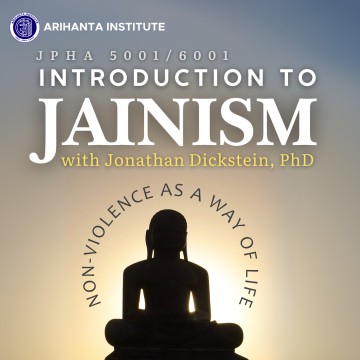
Introduction to Jainism: Non-violence as a Way of Life
This course provides an introduction to Jainism in India with a focus on the three “B”s—Belief, Behavior, Belonging. The course surveys the emergence of Jainism in ancient India, the life and teachings of Lord Mahavira, the ascetic and lay aspects of Jain society, Jain philosophy and ethics, and religious practices such as vegetarianism, fasting, and worship. The course lends particular emphasis to the ethic of ahiṃsā (non-violence) and its implications for contemporary Jain animal ethics and environmentalism. Upon successful completion of this class, students will be able to:Chart the historical development of Jainism in India.Identify the major features of Jain philosophy.Connect Jain philosophy to Jain practice, both ritual and ethical practice (“Applied Jainism”).Describe Jainism as a lived religion with its contemporary lived communities and aspects.Describe ethical contestations within Jain communities as they engage current issues such as feminist critique, consumer capitalism, industrial agriculture, climate collapse, and social justice writ large.
 Fall 2025 (September 2 – December 8, 2025)
Fall 2025 (September 2 – December 8, 2025)Wednesday 8:00 - 10:50 a.m. PT
Instructor
Graduate Course
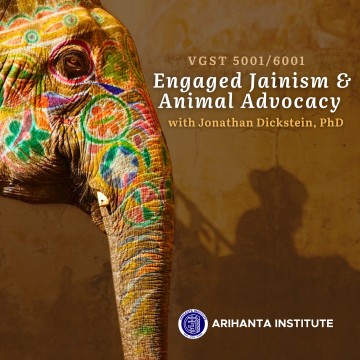
Engaged Jainism & Animal Advocacy
Added to cart
Engaged Jainism & Animal Advocacy
How do the core Jain values of ahiṃsā (nonharming), aparigraha (nonpossessiveness), and anekāntavāda (non-one-sidedness) relate to the ethics and practices of animal protection and advocacy? Jains have insisted on the practice of vegetarianism for millennia, but what else might a proactive “Engaged Jainism”' involve? Is vegetarianism sufficient on the dietary level? Is veganism sufficient? Why or why not? Part One of the course explores sites of institutionalized and corporate hiṃsā (harm) towards animals, focusing specifically on industrialized animal agriculture. The purpose of this—at times vivid—investigation is to begin to comprehend just how harmful these anthropogenic phenomena are for both the animals and humans contained therein. Part Two pivots to how Jainism—past, present, and future—interfaces with these phenomena. The focus will be on the Jain ethic of nonharming, how it determines dietary practices, but also specifically how it might motivate an “Engaged Jainism” that extends well beyond what one does and doesn’t eat. Part Three looks into past and contemporary animal advocacy movements and social justice activism more broadly understood. This part will look at the diversity of principles, targets, and tactics employed by these various movements. Specifically we will explore how these movements invoke nonviolence as the guiding force behind their educational, legal, political, entrepreneurial, and grassroots activist efforts to address the plights of animals. Upon successful completion of this class, students will be able to:Broadly chart the main features of contemporary industrial animal systems.Identify mainstream perspectives on animal use and consumption.Connect Jain and Non-Jain philosophy to practice (“applied ethics” and “Engaged Jainism”).Understand common forms of animal advocacy and activism and the debates surrounding them.Describe ethical contestations within Jain communities as they engage the questions of how advocacy and activism relate to ahiṃsā, noninterventionist. interpretations of karma theory, the validity of alternative views (nayas), and the lived lay realities of cultural “integration.” Student Reviews“Everything is really excellent.”— Graduate Student, Claremont School of Theology, 2024 “Excellent course and engagement by professor.” — Graduate Student, Claremont School of Theology, 2024
 Fall 2026
Fall 2026 Wednesday 8:00 - 11:50 a.m. PT
Instructor
Graduate Course
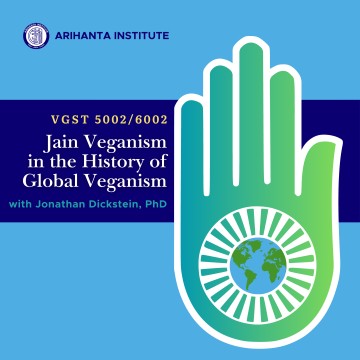
Jain Veganism in the History of Global Veganism
Added to cart
Jain Veganism in the History of Global Veganism
This course provides a historical overview of plant- (and non-plant-) based living from a regional perspective. Tracing the emergence and development of plant-dominant, vegetarian, and vegan diets in Asia, Africa, Europe, and the Americas, the course foregrounds the cultural, religious, and geographic factors behind these—as well all adjacent and alternative—consumption patterns. Pivoting from the regional to the global, the course then explores the emergence of transnational veganism and how Jain veganism fits in this modern phenomenon. Upon successful completion of this class, students will be able to:Locate significant features of international food patterns.Identify cultural and historical food trends and their relationships to economics and politics.Connect Jain and Non-Jain philosophies to food practices (“Engaged Religion”).Understand relationships between religion, the body, and consumption.Describe the intricacies of the Jain diet, past and present. Student Reviews“I appreciated the breadth and depth of the topic! More than any material I've yet consumed or classes I've taken, this course changed my ideas on what "vegan" means - for the better. I gained more cultural literacy and conversational competencies, which then created a direct positive effect on my daily and activist life. This course is truly fantastic and I appreciated it a great deal.”— Graduate Student, Claremont School of Theology, 2024 “All the materials and assignments were interesting, I looked forward to this course a great deal every single week. I appreciated the global and historical perspective and I think this course would be a fantastic introduction for anyone interested in animal studies, veganism, animal rights, and/or cultural foodways. ” — Graduate Student, Claremont School of Theology, 2024
Instructor
Graduate Course
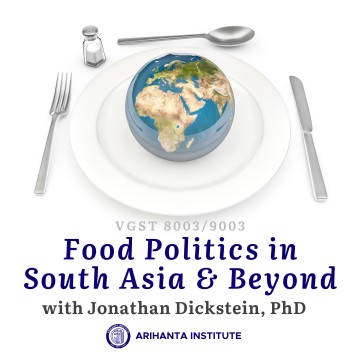
Food Politics in South Asia & Beyond
Added to cart
Food Politics in South Asia & Beyond
This course delves into the intricate dynamics of food practices, systems, and politics in South Asia, with a particular emphasis on India's diverse religious, regional, class, and caste groups. It aims to foster a nuanced understanding that food is never merely sustenance but serves as a potent vehicle for constructing and expressing individual, familial, regional, and even national identities, with profound social and often discriminatory consequences. The course begins with an exploration of religious perspectives on food production, preparation, consumption, and commensality, focusing on dietary prescriptions and proscriptions in Jainism, Hinduism, Buddhism, and Islam. From there, the content transitions to contemporary issues, events, laws, and policies that illustrate how food is weaponized in projects of social demarcation and oppression. Key topics include the rise of vegetarian Hindu nationalism, the pure/impure dichotomy, gender and "women's work," colonial influence on production and consumption, the contemporary Westernization of South Asian foodways, “peasant” resistance movements, and the differentially-impactful ecological ramifications of increasingly industrialized food systems. The course culminates with a brief discussion of specific gastropolitical debates in Central, East, and Southeast Asia, as well as in the South Asian diaspora in North America, providing a comparative and transnational perspective. Upon successful completion of this class, students will be able to:Describe (with examples) how integral food is to identity formation.Locate significant features of regional food politics.Identify the intersections of religion, gender, race, class, and caste in conflicts around food production and consumption.Compare and contrast Jain, Hindu, Buddhist, Sikh, Muslim, and Christian foodways.Discuss the impacts of colonialism, Westernization, and industrialization on South Asian food systems.
Instructor
Graduate Course
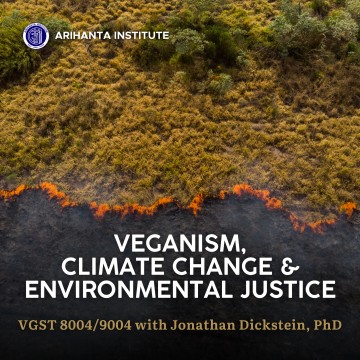
Veganism, Climate Change, and Environmental Justice
This interdisciplinary course explores the intersections between veganism, climate change, and environmental justice. It considers veganism not merely as a dietary or lifestyle choice, but as a political and ecological practice. Through philosophical, scientific, and activist perspectives, students will interrogate the environmental impacts of animal agriculture, the racialized and classed dimensions of climate vulnerability, and the transformative potential of food systems rooted in justice and care. Learning ObjectivesGain a basic understanding of the origin, history, and applications of veganism both regionally and globally.Understand the main features of the global climate crisis and their relationship to industrial food systems.Connect climate crisis to differential climate vulnerability, or how environmental consequences impact populations differently due to race and class-based discrimination.Understand the basis tenets of environmental justice, with respect to animal-based industries in particular.Deploy tools for constructive dialogue across cultures and religions regarding veganism, climate change, and environmental justice.
 Spring 2026 (January 26 – May 4, 2026)
Spring 2026 (January 26 – May 4, 2026)Thursday 8:00 - 10:50 a.m. PT
Instructor
Enrollment Options
14-DAY FREE TRIAL
- Free, unlimited access to our self-paced courses for 14-days.
- Already used your free trial? Enroll in our Monthly or Annual Membership options at anytime and continue learning immediately!
MONTHLY MEMBERSHIP
- $45 USD / Month
-
Immediate access to course
#### | Name. - Unlimited access to our live and self-paced courses for one month, with month-to-month auto rollover.
- Excludes graduate seminars, language courses, and courses hosted on partner platforms.


 Jonathan Dickstein, PhD
Jonathan Dickstein, PhD Christopher Miller, PhD
Christopher Miller, PhD